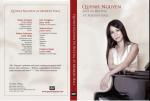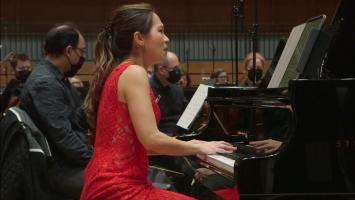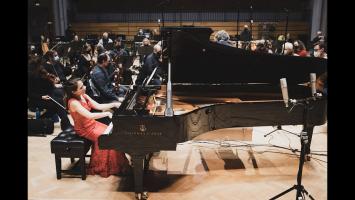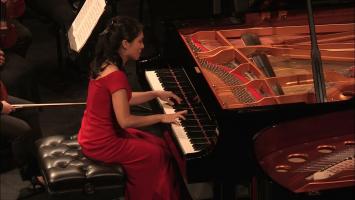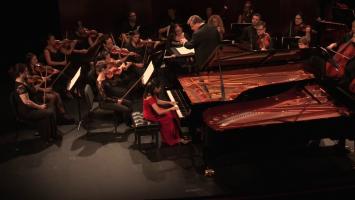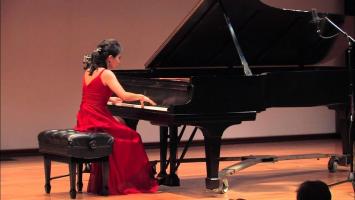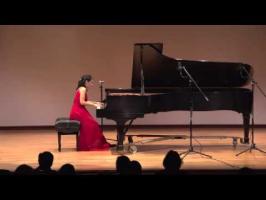Music
Born in Seattle, Chihara is of Japanese heritage, though his interests range far and wide, from Beethoven – in the hugely entertaining Four Reveries, a rich mosaic of quotes and allusions – to ‘the tradition of Fauré and Debussy, with occasional nods to Ellington and Gershwin’ in Ami (there is a touch of Schumann, too, in the finale), to East Asian musical forms in the Concerto-Fantasy. This last was written for Vietnamese-born Quynh Nguyen, who performs this ‘personal tribute and musical portrait’ of her with considerable panache, relishing the many Vietnamese elements in the score as much as the more American ones. Expressively, the piece opens and closes in the light, but there are darker moments, particularly the martial scherzo, full of drums and sounds of conflict.
Nguyen is equally persuasive in the Bagatelles, which take Japanese folk material (note the subtitle, ‘Twice Seven Haiku’) in a manner suggested by Bartók and covering a wide variety of moods. Dedicatee Jerome Lowenthal recorded these for Bridge; enchanting accounts, but Nguyen’s are no less so. Nguyen shows throughout a consistent and innate understanding of Chihara’s eclectic piano-writing, relishing its textural delicacy as much as its energy and the webs of allusions that are a common feature of all the music. Nguyen’s touch – in every sense – is pitch perfect; her version, with Rieko Aizawa, of Ami is arguably finer than that of the Rogés, for whom it was written! Naxos’s clear yet intimate sound completes a terrific release, one that has grown on me with each playing....
Guy RickardsGramophone
read moreChihara: Concerto-Fantasy for Piano and Orchestra; Bagatelles; Reveries; Ami Review by James Manheim
The music of Paul Chihara, who spent part of his childhood in an internment camp in Idaho, takes Asian-Western dichotomies as points of departure, but that statement is too simple for all the variety of ways the combination can play out. The marquee item here is the recent Concerto-Fantasy for piano and orchestra, written for the young pianist Quynh Nguyen and premiered by her with the Vietnamese National Orchestra; here, it is sympathetically read by the London Symphony under conductor Stephen Barlow. The concerto has a unique concept, loosely describing the career of pianist Nguyen, although there is also a Vietnam War movement from before her time. The startling entrance of boogie-woogie in the second movement after the Vietnamese-inspired first movement is typical of Chihara's aesthetic. In some ways, this album would make a good introduction to Chihara's style, which is boiled down to its essentials in the Bagatelles ("Twice Seven Haiku for Piano") of 2011. These little pieces have the concision of Beethoven's Bagatelles, with such delightful titles as "Drinking Song for Kittens" (based on a Japanese song) and "Hip Hop Farmer." Beethoven takes center stage in the Four Reveries for piano, each a quasi-improvisatory essay in which bits of Beethoven's piano sonatas emerge from reflective material (the "Sayonara" movement is based, naturally, on "Les Adieux"). Sample the opening "RAG 109," based on the first movement of the Piano Sonata No. 30 in E major, Op. 109. The final Ami for piano four hands was written for the wedding in Japan of two of the composer's friends. Both ingenious and richly evocative and beautifully and quietly played besides, this is a wonderful release.
James ManheimAllmusic
read moreThis magnificent selection by Vietnamese-born pianist Quynh Nguyen offers a very representative panorama of French composer Germaine Tailleferre’s solo piano work. It covers a little over 60 years of the career of this underrated member of the Group of Six founded in 1920 including Poulenc, Milhaud, Honegger, Auric and Durey. This anthology has been carefully planned in chronological order, from Impromptu 1912 (her first published work) to one of her latest, Singeries dated 1975, that is, near the end of his professional career.
...
After three albums previously released on the Arabesque label (Bach, Beethoven, Schubert, Chopin, Ravel, Messiaen) and obtaining a doctorate, Quynh Nguyen has a lasting commitment to French music culture. Having won a scholarship (Fulbright Fellowship) to improve herself in Paris, it is where she discovered all the inspiration needed to carry out her new record project: to delight the melomaniacs of the unknown repertoire of a woman with subtle and irresistible creativity.
Thanks to her immense talent and interpretive finesse, Quynh Nguyen clearly won her bet. Well-served by a natural and balanced take, this splendid pianist has just gained a reputation as a “wonderfully communicative” performer, according to US critic Harris Goldsmith, who heard her during his Carnegie Hall debut....
Guy SauvePassion-Musique-et-Culture-100064738864320/
read moreThere is much musical wit and elegance, from the lyric opening Impromptu to the hilarious – and surely unique – playfulness of Chiens and the love of the absurd, even surreal, in the ‘umbrella fugue’ (Fugue du Parapluie) from 1950. The 1952 suite L’aigle des rues is by turns sun-drenched, tender, humorous, learned and spiritual. The Berceuse from 1936 is simply gorgeous. Nguyen has produced a valuable document of Germaine Tailleferre’s piano works
Natasha Loges Tailleferre – The Flower of France - Instrumental - Reviews - Classical Music BBC Music MagazineWe are indeed fortunate that women, so long relegated to a subservient position in a male dominated society, seem to be at the point of discovery and evaluation as to their true quality and craftsmanship in the creative aspects of composition. Under the title Flower of France (8 short children’s pieces), the only female member of “Le Six” one might think gets her due with 40 selections from her piano music. These join a relative paucity of material that has made an appearance from time to time.
All of these selections are quite short, but they do exude a considerable amount of charm in the context of a French and neobaroque sensibility. Any attempt at larger forms is limited to a grouping of movements such as the Partita for Piano (1957), consisting of 3 movements and 2 sections from the ballet Parisa (1953).
Based on what we have here we might assume that the composer is primarily a miniaturist, but a body of concertante works remains to be discovered, as does an opera. According to the pianist’s excellent notes the fly in the ointment might be a problem in the composer’s estate. Until the situation is settled we must be thankful for this treasurable body of music, lovingly and effectively played by Quynh Nguyen.
The pianist is a graduate of the Juilliard School and Mannes College of Music, where she was a student of Bella Davidovich, Jacob Lateiner, Martin Canin, and Jerome Rose. She is on the faculty of Hunter College and City University of New York. Needless to say, she does the music proud, and this can be unreservedly recommended.
—Alan Becker, American Record Guide, November 2023
Alan BeckerAmerican Record Guide, November 2023
read moreWhile most modern-day listeners are not likely to relate to the subjects that inspired these pieces, it’s hard to imagine any listener who wouldn’t appreciate the music for its charm, elegance, sophisticated humor, and genuine beauty. In these performances by Quynh Nguyen, Tailleferre emerges as a distinct voice among her Les Six companions, and a composer whose output is deserving of more attention than it has received. Sensitive, poetic, communicative playing abounds throughout....
This is Quynh Nguyen’s Fanfare debut, though I note that she has previously recorded three albums for the Arabesque label, consisting of works by Bach, Beethoven, Schubert, Chopin, Ravel, and Messiaen. To her discography can now be added this very beautiful and beguiling Music & Arts album of works by Germaine Tailleferre. Allow me to echo James Harrington’s hope for more of Tailleferre and in this case, more of Quynh Nguyen.
—Jerry Dubins
This article originally appeared in Issue 47:2 (Nov/Dec 2023) of Fanfare Magazine.
Jerry DubinsFanfare MagazineThe Concert Fantasy for Piano and Orchestra is dedicated to pianist Quynh Nguyen and inspired by traditional Vietnamese music.
The first of the four movements is largely lyrical and neoclassical in expression. The second movement is influenced by jazz, while the scherzo sounds more dramatic at first. The composer says, « War has come to Hanoi, and the gorgeous traditional and natural world is being destroyed by chaos and violence. The music of this Scherzo is not a descriptive war symphony, but a sort of musical nightmare of violence, confusion, and dread. »
The fourth movement is again very quiet and lyrical, ending the concerto on a very conciliatory note.
The Bagatelles Twice Seven Haiku for Piano comprise two groups of seven small pieces each, which the composer with Japanese roots calls haiku. He says that they « reflect the stylistic dichotomy of Japanese and American musical and poetic influences. »
Some of these haikus were inspired by popular songs as well as Chihara’s film themes, but also include homage to Bach, Brahms, and Prokofiev. They are played brilliantly by Quynh Nguyen, as are the sweetly playful Four Reveries on Beethoven.
Remy Franck Editor in chief, Pizzicato President of the International Classical Music Awards ICMAhttps://www.pizzicato.lu/musikalisches-portrat-von-paul-chihara/
read moreMadame Tailleferre was also a respected pianist, playing duets with Eric Satie or Igor Stravinsky, so she naturally composed for the piano. Her piano pieces are neoclassical and always atmospheric. They are calm, dreamy, charming, rhythmically energetic, serious or witty, pastoral or dance-like, and some belong to the genre of pastiche.
Quynh Nguyen allows the music to retain its naturalness and French elegance. She has a good sense of rhythm, as well as dynamic and color nuances, plays with a brilliant lightness and a pictorial refinement. One therefore listens to this program with real pleasure....
Remy Franck https://www.pizzicato.lu
read moreThe Hanoi, Vietnam-born pianist Quynh Nguyen, now an American citizen, was born in 1976 and studied at the Juilliard School and Mannes College of Music, after debuts in Hanoi and some early training at the Gnessin Institute in Moscow, studying with Oleg Musorin. In New York her teachers have included Martin Canin, Jerome Rose, Jacob Lateiner, Bella Davidovich, and Robert Turner. She has concertised in Hungary, Germany, Switzerland, Austria and the United States. She is gifted with a tender musicality, allied with a dazzlingly deft balance between the hands that make her performances of Schubert and Chopin, as heard on this new disc, irresistible. In Chopin's Nocturne in E flat, her trills have a poignancy that is entirely suited to the music, while she expresses the joyous dash needed for the same composer's showpiece: the Andante Spianato and Grand Polonaise.
When Nguyen made her New York recital debut last year at Weill Hall, she was greeted by a rave notice from the usually judicious keyboard connoisseur Harris Goldsmith, who exclaimed, 'Ms. Nguyen's pianism and music-making are graced with beauty and exuberance. She is a real artist; a wonderfully communicative performer obviously intoxicated with the joy of living her music and sharing it with those lucky enough to hear it spring from her soul. What a compendium of intellect, sophistication and taste! True enough, Nguyen's Schubert is fresh and fleet, with a kind of poetic approach allied with digital dexterity in the tradition of the late Russian virtuoso Yuri Egorov, although more pliant and endearing than the splashy Egorov generally sounded...
Rarely does one hear a young artist with such a naturally flowing sense of melodic line - vivid and unforced - that permits the music to breath uninhibited. This flexible way of playing allows poetry and emotion to expand organically. Quynh Nguyen is already a major talent of the younger generation of keyboard artists, to be placed alongside Klara Wurtz and Irina Rees.
Benjamin IvryInternational Piano MagazineTake Vietnamese-American pianist Quynh Nguyen. Last year, she made her New York debut to a rave review from the dean of US piano critics, Harris Goldsmith. He cheered Ms. Nguyen's performance of Chopin, saying that she played more eloquently than such great keyboard heroes as "Ignaz Friedman, Perahia, Horowitz, Rubinstein – or anyone whose interpretations linger in the mind's ear.
This kind of reaction would, in other days, have guaranteed a recording contract, especially since she is young and photogenic. Instead, she has paid to publish two CDs, which are available on her website.
"... it would be better to have a recording contract with a big company," says Nguyen. But "I am happy that my music has reached a much wider audience...
Benjamin IvryChristian Monitor Science MagazineRecently, the latest recording by Vietnamese-American pianist Quynh Nguyen titled 'The Flower of France' was awarded the Gold Medal at the Global Music Awards in the US.
The piano album was curated by artist Quynh Nguyen from solo piano pieces as well as transcriptions and excerpts from ballets and film scores, including some rarely played or recorded pieces. This recording showcases the emotional, poetic playing of artist Quynh Nguyen....
Kieu Trang https://www.vietnamplus.vn/nghe-sy-piano-goc-viet-gianh-giai-vang-giai-thuong-am-nhac-toan-cau/88691
read moreHOME
Rarely does one hear a young artist with such a naturally flowing sense of melodic line - vivid and unforced - that permits the music to breath uninhibited. This flexible way of playing allows poetry and emotion to expand organically. Quynh Nguyen is already a major talent of the younger generation of keyboard artists.
International Piano MagazineMs. Nguyen's pianism and music making are graced with beauty and exuberance. She is a real artist; a wonderfully communicative performer. What a compendium of intellect, sophistication and taste!
New York Concert ReviewShe is often sensitive and poetic, ... she knows how to make (the music) dazzle with lively rhythm, piquant inflexions, and dashing virtuosity.
Richard DyerBoston GlobeRarely does one hear a young artist with such a naturally flowing sense of melodic line - vivid and unforced - that permits the music to breath uninhibited. This flexible way of playing allows poetry and emotion to expand organically. Quynh Nguyen is already a major talent of the younger generation of keyboard artists.
International Piano MagazineShe captures impressive and splendid characterization of musical creation through intensive animation and flexibility. With filigree technique, she charms everyone present with her music. . . [and] the listeners gave this musical romantic a wonderful reception. This pianist understands and has mastered the dramatic, lyrical and introvert nuances in Chopin compositions, and for this she received the biggest applause.
Wadern Newspaper, GermanyShe demonstrates in her performances a unique combination of virtuosity, poetry and passion. It is always a joy to be in the audience when she performs . . .
Jerome RoseFounder and Director, International Keyboard Institute & FestivalShe is gifted with a tender musicality, allied with a dazzlingly deft balance between the hands thatmake her performances of Schubert and Chopin, as heard on this new disc, irresistible.
International Keyboard MagazineHer playing of Ravel's ''Tombeau de Couperin'' was marvelous: she excels in everything that requires elegance, proportion, balance, taste, and wit.
Richard DyerBoston GlobeOther Press
Complete Piano Music by Paul Chihara
What the critics say. . .
"Nguyen shows throughout a consistent and innate understanding of Chihara's eclectic piano-writing, relishing its textural delicacy as much as its energy... Nguyen's touch - in every sense - is pitch-perfect."
Gramophone
"This exceedingly well-performed and recorded disc of the piano music of an American master is simply not to be overlooked among the barrage of CDs that risk overwhelming the readers of this magazine each issue."
Fanfare
"The recording is superb." American Record Guide
"Nguyen's brilliant and sensitive performance convinces the listener that she was born to play this music."
Fanfare
"Ingenious and richly evocative and beautifully played...a wonderful release." AlMusic
"Nguyen plays al these works as if they are little gems." Infodad
"Played brilliantly by Quynh Nguyen." Pizzicato
"This disc contains the complete piano works of the composer. I am happy to have these collected into a single recital, especially given the artistry of Vietnamese pianist Quynh Nguyen."
Fanfare
Press Coverage
Press Release • Quote Sheet • Radio Report
Selected Print/On-Line Coverage to Date Include:
Gramophone
AllMusic
Northwest Asian Weekly
Broadway World Review Broadway World Interview
LA Opus
The Rehearsal Studio
Fanfare Magazine
BNN
American Record Guide
Pizzicato – Luxembourg
In The SpotLight
Louisville Public Media
InfoDad
One Symphony Podcast
Cinemusical Blog
Atlanta Music Critic
WRUU 107.5 Savannah
Highlights of Radio Coverage Include:
SiriusXM Symphony Hall, PRX/Classical 24, New Music Buff, Inthecooler.org, WLRH Radio, APR Classical, KBAQ Radio, KKUP Radio, KUCI Radio Crystal Egg, KUCA Radio Classical Impacts, K-Mozart Radio Classical, KUSC Radio / New Releases, CapRadio Classical, KDFC Radio / New Releases, KDFC Radio / The Morning Show, KALW Radio / New Releases, KCME Radio / American Landscapes, KCME Radio / Classical, Colorado Public Radio, WMNR Radio, WWUH Radio, WFSU Radio, Georgia Public Broadcasting / Midday Music, WRUU Radio Interview, Hawaii Public Radio / Evening Concert
Hawaii Public Radio / Classical Pacific, Hawaii Public Radio / Sunday Brunch, WFMT Radio Interview, Illinois Public Media, Classical Music Indy, Louisville Public Media-WUOL Interview, New England Public Radio, CRB Radio / New Releases, WHRB Radio / New Releases, WRCJ Radio, Interlochen Public Radio, American Public Media, Your Classical Minnesota Public Radio, KCUR Radio, KKFI Radio / Classical Challenge, KWUR Radio / Classical, KKFI Radio, WUNH Radio, WWFM Radio, WMSC Radio, WNED Radio / Classical, WQXR Radio / New Releases, WGUC/ New Releases, WCLV Radio Ideastream, WGTE Radio / New Releases, All Classical Radio Portland, WQLN Radio, KVLU Radio, WRUV Radio, VPM Music, KING Radio Interview, WORT Radio, CKUW Radio, ABC Australia, Byte FM Germany, FINE Music Radio South Africa, Bradley Stoke Radio UK
Germaine Tailleferre - Flower of France
What the critics say . . .
“A treasurable body of music, lovingly and effectively played by Quynh Nguyen who does the music proud. This can be unreservedly recommended.”
American Record Guide
“This magnificent selection by Vietnamese-born pianist Quynh Nguyen offers a very representative panorama of French composer Germaine Tailleferre’s solo piano work.”
CD Chronicles
“Delightful, sensitive, and delicate playing of Germaine Tailleferre.”
KUSC Radio
“It is a wonderful exploration of the piano music of Germaine Tailleferre, I highly recommend it.”
WRUU Radio
“Quynh Nguyen allows the music to retain its naturalness and French elegance. She has a good sense of rhythm, as well as dynamic and color nuances, plays with a brilliant lightness and a pictorial refinement. One therefore listens to this program with real pleasure.”
Pizzicato
“Five stars: Alluring music by a wonderful composer performed by a wonderful artist.”
Fanfare
“Nguyen’s new record project is to delight the melomaniacs of the unknown repertoire of a woman with subtle and irresistible creativity. Thanks to her immense talent and interpretive finesse, Quynh Nguyen clearly won her bet. “Well-served by a natural and balanced take, this splendid pianist has a justly gained a reputation as a “wonderfully communicative” performer.”
Passion Musique et Culture
“Nguyen has produced a valuable document of Germaine Tailleferre’s piano works.”
BBC Magazine
“The Flower of France - Germaine Tailleferre Works for Piano, offers a very generous helping of pieces by Les Six’s only female composer, performed with striking beauty by pianist Quynh Nguyen.”
Fanfare
“This is a disc that every lover of French music should have. The music is beguiling, delightful, and beautiful, and when played by Quynh Nguyen completely irresistible. Her playing is tasteful and always keeps in mind the intimacy and character that each of the pieces deserves.”
Winnipeg’s Classic 107 Radio
“It’s about time. That’s a phrase that’s rightly heard more and more these days regarding the heightened interest, awareness, and research into women composers. The CD release The Flower of France: Music of Germaine Tailleferre (Music & Arts MA CD-1306, released July 7, 2023) is a perfect example of that. I highly recommend the disc and performances.”
Clef Notes-Illinois Public Media-WILL Radio
“I only know a very little of Tailleferre’s music and it intrigues me to hear more.”
WFMT Radio
“Interesting for all sorts of reasons!!!”
Cooler Classics/Mixcloud (streaming/internet)
“It’s hard to imagine any listener who wouldn’t appreciate the music for its charm, elegance, sophisticated humor, and genuine beauty.”
Fanfare
“This beautiful recording needs to be listened to in order to appreciate the stylization of an all-Parisian elegance and the soft harmonic hues flowing between impressionism and neo-classicism.”
Passion Musique et Culture
“Delightful, sensitive, and delicate playing of Germaine Tailleferre.”
KWMR Radio
‘In these performance by Quynh Nguyen, Tailleferre emerges as a distinct voice among her Les Six companions, and a composer whose output is deserving of more attention than it has received.”
Fanfare
“A winner for my audience. This makes a pleasant start to my program.”
KKUP Radio
“The Flower of France featuring the piano music of French composer Germaine Tailleferre, as performed by the fantastic Vietnamese-American pianist Quynh Nguyen features rarely if ever heard piano pieces written by a composer who is often unjustly overlooked.
Winnipeg’s Classic 107 Radio
“Sensitive, poetic, communicative playing throughout.”
Fanfare
“I love Tailleferre and Quynh does a lovely job with her.”
WMNR Radio
“Vietnamese-American pianist Quynh Nguyen performs a delightful selection of Germaine Tailleferre's bite-sized solo piano works on The Flower of France.”
ABC Australia
“To her discography can now be added this very beautiful and beguiling Music & Arts album of works by Germaine Tailleferre.”
Fanfare
“Many delights. I highly recommend the disc and performances.”
Illinois Public Media - Radio
“Allow me to echo James Harrington’s hope for more of Tailleferre and in this case, more of Quynh Nguyen.”
Fanfare
“This magnificent selection by Vietnamese-born pianist Quynh offers a very representative panorama of French composer Germaine Tailleferre’s solo piano work.”
Passion Musique et Culture
“This is a very lovely album. It's so pretty.”
HPR Radio
“Love to program this. Yes!”
KUCO Radio
“Love this. Good quality recording!”
WHRO Radio
“Enjoying this release.”
WORT
“We must be thankful for this treasurable body of music, lovingly and effectively played by Quynh Nguyen. Needless to say, she does the music proud, and this can be unreservedly recommended.”
American Record Guide
“Explore the wonderful piano music of Germaine Tailleferre. The amazing pianist Quynh Nguyen has release a CD called The Flower of France that features Tailleferre’s exceptional music. Amazing!!”
Winnipeg’s Classic 107 Radio
“Tailleferre is well-represented here.”
WGTE Radio
“It was a delight to discuss her album and background. Quynh has gathered together some of the finest compositions of Germaine Tailleferre into a delightful album - The Flower of France. She grew up in Vietnam and America and brings to the world her performances of some of the enchanting piano works of Germaine Tailleferre.”
Harmonious World Podcast
The concert was a wonderful opportunity to celebrate the friendship between the United States and Vietnam through music and culture. Quynh Nguyen’s performance was a great example of how music can build bridges and strengthen ties between two countries.
Respectfully,
Kate Bartlett
Cultural Affairs Officer
U.S. Embassy Hanoi
"Her delightful Weill Hall recital offered renditions of Bach's G-minor English Suite (with a witty suggestion of a tambourine in the Gavotte), Schubert's D-major Sonata, D. 850, and vernal, lyrical accounts of Chopin's E-major Scherzo and late E-flat Nocturne (Op. 55, No. 2). Likewise memorable was her fleet, crystalline Ravel Tombeau de Couperin at a later Merkin Hall concert."
Harris GoldsmithMusical AmericaShe is exquisitely trained as a pianist, pedagogue and scholar. She is a beautiful and exciting performer, a dedicated teacher and a profound writer on music. She exhibits this through her great experience on stage and accomplishments in the classroom. She is a most successful recording artist, adding to her artistic profile.
Jerome Rose - May 2023Founder and Director, International Keyboard Institute & FestivalYour performance of Mozart's Piano Concerto No. 17 in G Major, K.453 was splendid virtually from beginning to end. Your artistic approach to the Allegro shared your fluid technique and understanding of performance practice. I sincerely enjoyed how you constructed each phrase and how carefully you listened to and dialogued with the JägerMeister Orchestra and Maestro Zilberkant. Your enthusiasm for Mozart was evident in the Andante and the Allegretto-Presto as well. Mozart sounds like a first musical language for you. There was a clear musical narrative shared throughout the performance.
Congratulations and thank you for sharing such a delightful rendering. _ Micheal Benson
Michael BensonThe American PrizeMessiaen: Great feel, colors, phrasing all good. Excellent playing. Chopin: Very beautiful.
Jeffrey BiegelThe American Prize"[On] Saturday night, she made her local debut, and it was easy to understand why even people who are hard to please like her so much. She is a musical and expressive player who commands a flexible, singing sound. She is often sensitive and poetic, and when she should dazzle with lively rhythm, piquant inflexions, and dashing virtuosity -- as in Chopin's ''Andante spianato and Grand Polonaise brillante,'' or in the Chopin waltz she offered as an effervescent encore -- she knows how to. Quynh opened with an unusual Sonata in F Minor by Muzio Clementi, which she played in an operatic and romantic style. Her playing of Ravel's ''Tombeau de Couperin'' was marvelous: she excels in everything that requires elegance, proportion, balance, taste, and wit...Schumann's ''Kreisleriana'' was almost too beautifully played, with subtle interplay of inner voices... "
Richard DyerThe Boston Globe. . . her pianistic ability is beyond question; proven by her many concerts, reviews and recordings. She demonstrates in her performances a unique combination of virtuosity, poetry and passion. It is always a joy to be in the audience when she performs . . . [She is] a brilliant pianist . . . she has worked with me as well asBella Davidovich and is a truly wonderful artist . . . she is extraordinary in every way . . . there is a loveliness and strength to her playing and true qualities that make her a superb performer of Chopin.
Jerome Rose,Faculty, Mannes College of MusicQuynh plays with great dexterity and technique, but also with artistry and sensitivity –and a very personal touch of romance in her interpretations. There is poetry in her every phrase and great emotion (often painful sadness and at other times joyful and playful exuberance). Ms. Nguyen is a consummate artist, with an excellent ear (she has perfect pitch), and very traditional music training, excelling in Baroque as well as classical styles. But her very special forte is the music of passion and youthful expression, which makes her every performance an adventure!
Paul Chihara - March 2023Paul Chihara - March 2023This young pianist, born in Vietnam and trained in Russia as well as in the United States, received high praise from reliable quarters for her New York debut recital last year. Now she offers an interesting and well-varied program of Clementi (Sonata Op. 13 No. 6), Schumann ("Kreislariana"), Ravel ("Le Tombeau de Couperin") and Corigliano ("Fantasia on an Ostinato").
James OestreichThe New York TimesA New York debut of exceptional distinction was played by pianist Quynh Nguyen on March 3rd at Weill Hall as part of Artists International’s Debut Winners Series. Ms. Nguyen, who was born in Vietnam to a family of musicians, played her first recital at the age of nine, and at eleven made her orchestral debut performing Mozart’s Concerto No. 20 in D minor, K. 466. That same year she gave a recital in Moscow, and at 13, received a full scholarship to study at the Gnessin Institute in Moscow. She continued her studies as a scholarship student at the Juilliard School and at the Mannes College of Music, where she received her Bachelor’s and Master’s degrees respectively. She is currently enrolled in the DMA program at CUNY. Her teachers include Oleg Mussorin, Robert Turner, Bella Davidovich, Alexander Paley, Jacob Lateiner and Jerome Rose. And, as her bio for the recital adds, “she has performed in master classes given by Tatiana Nicoleiva, Garrick Ohlsson, Bryce Morrison, Pavlina Dokovska, Peter Frankel, Richard Goode, and András Schiff”. Ms. Nguyen’s credentials are indeed impressive, and little wonder that she has distinguished herself in various piano competitions and gained extensive concert experience worldwide—in Hungary, Germany, Switzerland, Austria, and the United States.
But even my fondest hopes and expectations were gloriously sustained and surpassed by this dream of a recital. Ms. Nguyen’s pianism and music making are graced with beauty and exuberance. She is a real artist; a wonderfully communicative performer obviously intoxicated with the joy of living her music and sharing it with those lucky enough to hear it spring from her soul. What a compendium of intellect, sophistication and taste! And she is also (in her unobtrusive way) an accomplished virtuoso, equipped to dispatch even some of the most difficult and subtle compositions on her program (J.S. Bach’s English Suite in G minor BWV 808, Schubert’s Sonata in D major, Op. 53, D. 850; and three of Chopin’s most rarified masterworks, his Scherzo No. 4 in E major, Op. 54; his late Nocturne in E flat major, Op. 55 No. 2; and earlier but demanding Andante Spianato and Grande Polonaise, Op. 22).
The Bach Suite took wing with infectious brio. Her propulsive way with the opening Preludium may have initially seemed too dangerously precipitate but the rhythmic control was secure and admirable steady. The ensuing Allemande, Courante, Sarabande, Gavotte and Gigue all likewise shared that same lustrous singing tone. The Sarabande was especially modest and eloquent, and she brought a delightful sense of humor to her fleet delivery of the Gavotte (with the tambourine-like repeated bass notes in its second strain deliciously and tastefully emphasized; and the almost Schumannesque maggiore central Trio poignantly savored).
The first movement of the Schubert Sonata took wing at an almost wicked clip. Here, if there is any room for reservation, Ms. Nguyen might have allowed for just a hairbreadth more tonal solidity and breathing space to make the most of this extremely Beethovenian writing. But, no matter, the potentially quirky crossing of hands and such were admirably under rhythmic control (no Schnabel-like desperation this time!). And how Ms. Nguyen’s spot-on sense of color and timing kept the potentially repetitious Con moto second movement airborne. (All of the myriad variations of filigree were splendidly creative and engaging and never once did interest flag). For once, there were no “editorializing” of rhythm in the Allegro vivace Scherzo (again that “Tradition” established almost reflexively by that famous old Schanbel recording), and in retrospect it was a pleasant and unpretentious departure from precedent. The Rondo: Allegro moderato, taken a bit more rapidly than usual, delectably recreated the nursery-rhyme “Sing a Song of Six Pence” quality in this fleet and lovely version.
And so it was with the Chopin group heard after intermission: the Fourth Scherzo had an almost Mendelssohn-like gossamer quality. Filigree was impishly tossed off, the octaves sonorously in place, and the central Trio section again achieved without fuss or contortion. The Nocturne was, if anything, even better: the absolute highpoint of the afternoon: I have never heard it played more eloquently, by Ignaz Friedman, Perahia, Horowitz, Rubinstein—or anyone whose interpretations linger in the mind’s ear. (Yes, this performance was truly sublime.) The Andante Spianato had a classical simplicity and proportion, and the following Grande Polonaise—a brilliance and swagger—with some effective left hand anticipations and octave amplifications making the proceedings all the more stylish and effective.
We will, no doubt, be regularly hearing much more from Quynh Nguyen: Remember her name!
Harris GoldsmithNew York Concert ReviewShe was my student at The Juilliard School for four years during which time she showed herself to be a wonderful young artist. She has impressive technical and musical assets, along with discipline and desire to develop herself. She made wonderful progress while studying with me and I look forward to watching her life as professional pianist evolve.
Bella DavidovichFaculty, The Juilliard School



